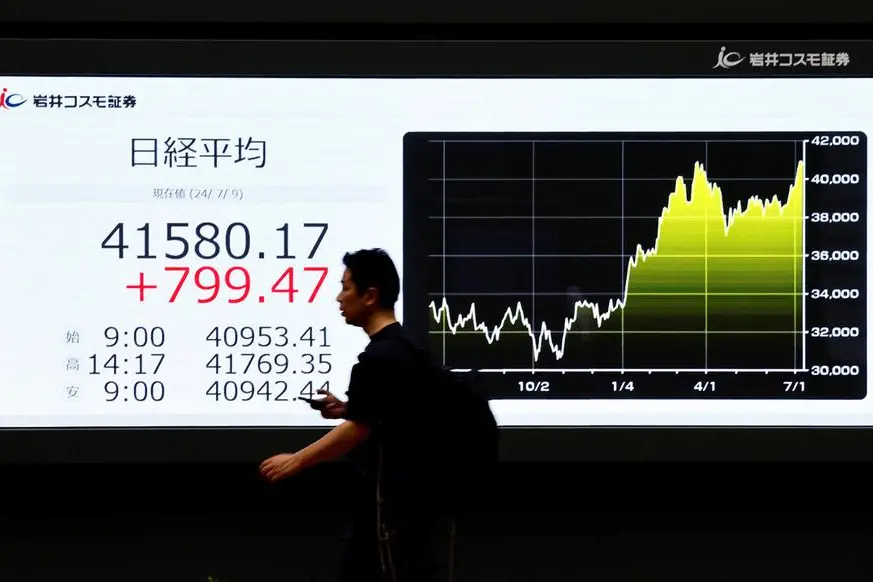PHOTO
SYDNEY: Asian shares are ending a rough week on a high as Japanese stocks are close to recouping all of the huge losses from Monday, while the yen slipped again as markets pared back the chance of an outsized U.S. rate cut.
Japan's Nikkei rose another 1.7% on Friday, tracking a strong rebound on Wall Street overnight. It has erased most of a 13% crash on Monday and was set for a weekly drop of just 1.5%.
MSCI's broadest index of Asia-Pacific shares outside Japan climbed 1.4%, more than reversing the drop from Thursday. For the week, it is down 0.3%.
Overnight, data showed U.S. jobless claims fell more than expected last week, suggesting fears the labor market is unraveling were overblown. That led markets to pare back the chance of an outsized half-point rate cut from the Federal Reserve in September to 54% from 69% a day earlier.
Stocks had sold off sharply after last week's U.S. jobs report sparked fears of a potential U.S. recession, but investors have bought into the recent dip, with the Nasdaq 3% higher overnight and S&P 500 up 2.3%.
Also helping sentiment is Chinese data showing that consumer inflation ran at 0.5% in July, above forecasts of a gain of 0.3%, suggesting there is less risk of the economy sliding into outright deflation.
Chinese blue chip stocks rose 0.5%, and Hong Kong's Hang Seng index jumped 1.4%.
"The prospect of better-than-feared U.S. growth and a weaker yen constrain the fundamental and technical risks that inspired the extreme volatility experienced at the start of the week," said Kyle Rodda, a senior financial market analyst at Capital.com.
"It's unlikely that the markets have turned the corner yet. Whether this week's volatility is an omen of deeper downside or merely a growth scare will depend on the August Non-Farm Payrolls report and whether it reveals further deterioration in labour market conditions."
A few Federal Reserve officials said they were increasingly confident that inflation is cooling enough to allow interest-rate cuts ahead, but not because of the recent market rout.
Kansas City Fed President Jeff Schmid, one of the more hawkish policymakers, said he viewed the current policy stance as "not that restrictive", the economy resilient and labour market still quite healthy.
"If inflation continues to come in low, my confidence will grow that we are on track to meet the price stability part of our mandate, and it will be appropriate to adjust the stance of policy," said Schmid.
The U.S. dollar gained on the strong jobless claims data. It was up for a fourth straight day on the Japanese yen at 147.35 yen, on course for an advance of 0.6% this week, despite Monday's precipitous 1.5% plunge.
The yen had gained earlier in the week following a surprise rate hike by the Bank of Japan, which led to the unravelling of the popular carry trade - where investors borrow yen at low rates to buy higher yielding assets - but that seemed to be stabilising.
The BOJ's reassurance that it will not be hiking interest rates amid market volatility also helped sentiment recover.
Commodity Futures Trading Commission figures later on Friday will give a clearer indication of whether that unwinding has now run its course.
Bond yields have climbed this week with safe havens in less demand. U.S. 10-year yields held at 3.9781%, well off Monday's low of 3.667%, and were set for a weekly gain of 18 basis points.
Two-year yields were up 15 bps this week to 4.0193%.
In commodities, crude oil slipped on Friday but are set for decent weekly gains on supply fears amid the widening conflict in the Middle East as Israel waits for a threatened attack from Iran and its proxies.
Brent crude futures fell 0.2% to $78.97 a barrel, but were up more than 3% for the week, while U.S. West Texas Intermediate crude also slipped 0.2% to $76.03, also up over 3% for the week.
Gold prices also eased, down 0.1% at $2,424.26 an ounce.
(Reporting by Stella Qiu; Editing by Stephen Coates)




















